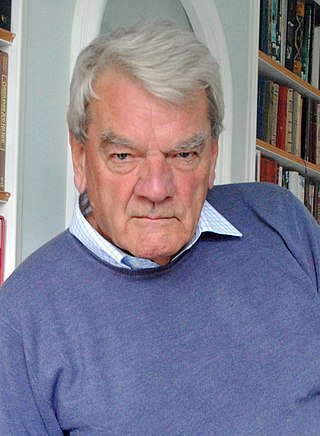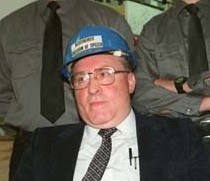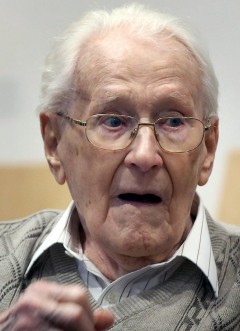Historical negationism, also called historical denialism, is falsification or distortion of the historical record. This is not the same as historical revisionism, a broader term that extends to newly evidenced, fairly reasoned academic reinterpretations of history. In attempting to revise and influence the past, historical negationism acts as illegitimate historical revisionism by using techniques inadmissible in proper historical discourse, such as presenting known forged documents as genuine, inventing ingenious but implausible reasons for distrusting genuine documents, attributing conclusions to books and sources that report the opposite, manipulating statistical series to support the given point of view, and deliberately mistranslating traditional or modern texts.
Holocaust denial is an antisemitic conspiracy theory that asserts that the Nazi genocide of Jews, known as the Holocaust, is a fabrication or exaggeration. Holocaust denial includes making one or more of the following false claims:
The Institute for Historical Review (IHR) is a United States–based nonprofit organization which promotes Holocaust denial. It is considered by many scholars to be central to the international Holocaust denial movement. Self-described as a "historical revisionist" organization, the IHR promotes antisemitic viewpoints and has links to several neo-Nazi and neo-fascist organizations.

David John Cawdell Irving is an English author who has written on the military and political history of World War II, especially Nazi Germany. He was found to be a Holocaust denier in a UK court in 2000 as a result of a failed libel case.

Ernst Christof Friedrich Zündel was a German neo-Nazi publisher and pamphleteer of Holocaust denial literature. He was jailed several times: in Canada for publishing literature "likely to incite hatred against an identifiable group", and on charges of being a threat to national security; in the United States, for overstaying his visa; and in Germany for charges of "inciting racial hatred". He lived in Canada from 1958 to 2000.
Fred Arthur Leuchter Jr. is an American manufacturer of execution equipment and Holocaust denier, best known as the author of the Leuchter report, a pseudoscientific document alleging there were no gas chambers at Auschwitz-Birkenau. Prior to the document's publication, he was contracted by authorities of several U.S. states to improve the designs of instruments for capital punishment. He was charged in Massachusetts with misrepresenting himself to penitentiaries as an engineer, despite having no relevant qualifications. He plea bargained with state prosecutors and received two years' probation. He has also been accused of running a "death row shakedown", where he threatened to testify for the defense in capital cases if he was not given contracts for his services by that state.

Richard Nelson Williamson is a British independent traditionalist Catholic bishop who opposes the changes in the church brought about by the Second Vatican Council.

Deborah Esther Lipstadt is an American historian and diplomat, best known as author of the books Denying the Holocaust (1993), History on Trial: My Day in Court with a Holocaust Denier (2005), The Eichmann Trial (2011), and Antisemitism: Here and Now (2019). She has served as the United States Special Envoy for Monitoring and Combating Anti-Semitism since May 3, 2022. Since 1993 she has been the Dorot Professor of Modern Jewish History and Holocaust Studies at Emory University in Atlanta, Georgia, US.
The Leuchter report is a pseudoscientific document authored by American execution technician Fred A. Leuchter, who was commissioned by Ernst Zündel to defend him at his trial in Canada for distributing Holocaust denial material. Leuchter compiled the report in 1988 with the intention of investigating the feasibility of mass homicidal gassings at Nazi extermination camps, specifically at Auschwitz. He traveled to the camp, collected multiple pieces of brick from the remains of the crematoria and gas chambers, brought them back to the United States, and submitted them for chemical analysis. At the trial, Leuchter was called upon to defend the report in the capacity of an expert witness; however, during the trial, the court ruled that he had neither the qualifications nor experience to act as such.

The Holocaust—the murder of about six million Jews by Nazi Germany from 1941 to 1945—is the most-documented genocide in history. Although there is no single document which lists the names of all Jewish victims of Nazi persecution, there is conclusive evidence that about six million Jews were murdered. There is also conclusive evidence that Jews were gassed at Auschwitz-Birkenau, the Operation Reinhard extermination camps, and in gas vans, and that there was a systematic plan by the Nazi leadership to murder them.
The Adelaide Institute was a Holocaust denial group in Australia and is considered to be antisemitic by the Australian Human Rights Commission and others. The Adelaide Institute was formed in 1995 from the former Truth Mission that was established in 1994 by Fredrick Töben, later a convicted Holocaust denier. Töben directed the Institute until his incarceration in 2009 in South Australia for contempt of court. Peter Hartung assumed the role of director of the Adelaide Institute. On assuming the role from Töben, Hartung defied the Federal Court by publishing the revisionist material that led to Töben's three months jail time. In June 2009, the Adelaide Institute was linked with an American white supremacist, James von Brunn, charged with killing a security guard in Washington's Holocaust Museum.
Germar Rudolf, also known as Germar Scheerer, is a German chemist and a convicted Holocaust denier.

The Holocaust had a deep effect on society both in Europe and the rest of the world, and today its consequences are still being felt, both by children and adults whose ancestors were victims of this genocide.

Between 1941 and 1945, the government of Nazi Germany perpetrated the Holocaust: a large-scale industrialised genocide in which approximately six million Jews were systematically murdered throughout German-occupied Europe. Since World War II, several countries have criminalised Holocaust denial—the assertion by antisemites that the genocide was fabricated or has been exaggerated. Currently, 17 European countries, along with Israel and Canada, have laws in place that cover Holocaust denial as a punishable offence. Many countries also have broader laws that criminalise genocide denial as a whole, including that of the Holocaust. Among the countries that have banned Holocaust denial, Austria, the Czech Republic, France, Germany, Hungary, Israel, Poland, Romania, Russia and Ukraine have also banned Nazi symbols. Additionally, any expression of genocide justification is also a criminal offence in several countries, as is any attempt to portray Nazism in a positive light.

Dariusz Ratajczak was a Polish historian, publicist and right-wing activist. In 1999, he was convicted of Holocaust denial in Poland.

Sylvia Stolz is a German Neo-Nazi, convicted Holocaust denier and former lawyer. Denial of the Holocaust is a criminal offense in Germany.

Oskar Gröning was a German SS Unterscharführer who was stationed at the Auschwitz concentration camp. His responsibilities included counting and sorting the money taken from prisoners, and he was in charge of the personal property of arriving prisoners. On a few occasions he witnessed the procedures of mass killing in the camp. After being transferred from Auschwitz to a combat unit in October 1944, Gröning surrendered to the British at the end of the war; his role in the SS was not discovered. He was eventually transferred to the UK as a prisoner of war and worked as a farm labourer.

David Irving v Penguin Books and Deborah Lipstadt is a case in English law against American historian Deborah Lipstadt and her British publisher Penguin Books, filed in the High Court of Justice by the British author David Irving in 1996, asserting that Lipstadt had libelled him in her 1993 book Denying the Holocaust. The court ruled that Irving's claim of libel relating to Holocaust denial was not valid under English defamation law because Lipstadt's claim that he had deliberately distorted evidence had been shown to be substantially true. English libel law puts the burden of proof on the defence, meaning that it was up to Lipstadt and her publisher to prove that her claims of Irving's deliberate misrepresentation of evidence to conform to his ideological viewpoints were substantially true.
Vincent Reynouard is a French Holocaust denier and proponent of neo-Nazism. He has been convicted and jailed in France under the Gayssot Act, which bars Holocaust denial.
Ursula Hedwig Meta Haverbeck-Wetzel is a German neo-nazi activist from Vlotho. Since 2004, she has been the subject of multiple lawsuits and convictions for Holocaust denial, which is a criminal offense in Germany.











